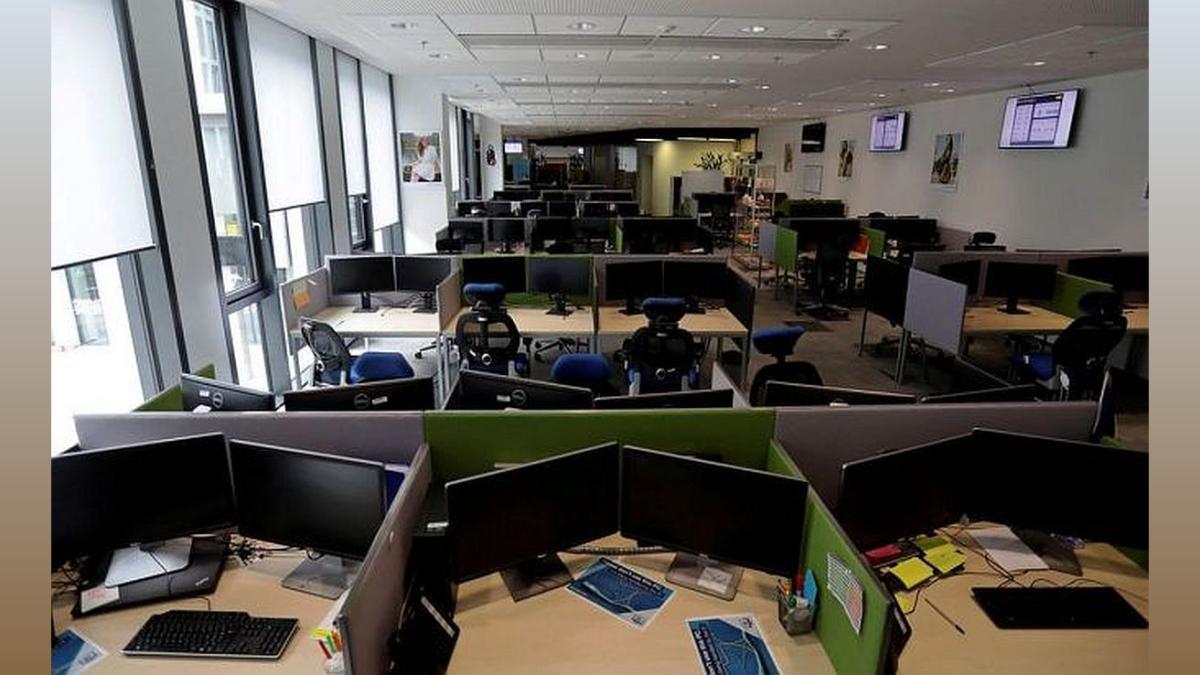Co-working Desks Surge for GCCs in India: Knight Frank
Co-working spaces see rising demand from Global Capability Centres (GCCs) in India, driven by cost advantages and talent pool, according to Knight Frank.

Photograph: David W Cerny/Reuters
New Delhi, Oct 28 (PTI) Co-working space operators have given nearly 23,000 desks to Global Capability Centres (GCCs) during the first nine months of this calendar year with MNCs preferring managed flexible office space, according to Knight Frank.
Real estate consultant Knight Frank India's report 'GCC Driving India's Real Estate Growth Story' mentioned that the GCCs have emerged as the primary occupiers of flex spaces across the country.
"GCC occupied flex seats across eight key markets increased from 17,380 in 2023 to 22,881 in the first nine months of 2024," it added.
The consultant said that a year-on-year (YoY) analysis of GCC flex seat occupancy showed a decline in usage from the year 2021 to 2023, as companies transitioned back to traditional office spaces with the easing of the COVID-19 pandemic.
"However, 2024 saw a shift with flex seat occupancy by GCCs increasing once again. This resurgence is linked to slower economic growth in the US, prompting companies to leverage India's cost advantages and talent pool, boosting demand for flexible workspaces," Knight Frank said.
Bengaluru dominates 41 per cent of GCC-focussed flex space occupancy across eight markets in India.
Shishir Baijal, Chairman and Managing Director of Knight Frank India, said India is a preferred destination for multinational corporations, with US companies leading the way.
"The cost-efficient nature of flexible workspaces has further driven a notable increase in occupancy rates among Global Capability Centres (GCCs) in 2024. With a thriving talent pool and competitively priced commercial assets in key markets, GCCs are well-positioned for sustained growth in the coming years," he added.
Currently, GCCs occupy almost 202.6 mn sq ft of Grade A office space across India's top six cities, with Bengaluru and Hyderabad contributing three-fourths of this leased space.
Of the 1,900 GCCs in India, about 66 per cent originate from the Americas, with 1,250 from the US and 30 from Canada. Another 27 per cent of India's GCCs originate from the EMEA (Europe, the Middle East, and Africa) region. The APAC region, though smaller contributes 7 per cent, with 44 GCCs from Japan, 25 from Singapore and 15 from Australia.
On this trend, Parul Thakur, Senior Vice President and Business Head of Cowrks, said, "The growing demand for managed office spaces is reshaping how corporates and enterprises develop their workplace strategies. As businesses continue to emphasise flexibility, scalability and collaboration, managed office solutions are delivering the essential infrastructure and adaptability needed to succeed in today's dynamic business landscape."
Shesh Rao Paplikar, Founder & CEO of BHIVE workspaces, said India's rise as a hub for GCCs in many ways has also been anchored by the coworking and managed workspaces industry offering office spaces that spur innovation and creativity while helping companies optimise their infrastructure costs.
Aditya Verma, Co-Founder & CEO of The Office Pass, said, "The GCC's rise in the Indian office market has witnessed a surge in demand for flex seats, with key markets leading the shift towards agile workspaces."
Occupied flex seats across major markets reflect a growing trend towards flexible and hybrid working models, underscoring a shift in how businesses operate in a rapidly evolving economic landscape, Verma added.
Real estate consultant Knight Frank India's report 'GCC Driving India's Real Estate Growth Story' mentioned that the GCCs have emerged as the primary occupiers of flex spaces across the country.
"GCC occupied flex seats across eight key markets increased from 17,380 in 2023 to 22,881 in the first nine months of 2024," it added.
The consultant said that a year-on-year (YoY) analysis of GCC flex seat occupancy showed a decline in usage from the year 2021 to 2023, as companies transitioned back to traditional office spaces with the easing of the COVID-19 pandemic.
"However, 2024 saw a shift with flex seat occupancy by GCCs increasing once again. This resurgence is linked to slower economic growth in the US, prompting companies to leverage India's cost advantages and talent pool, boosting demand for flexible workspaces," Knight Frank said.
Bengaluru dominates 41 per cent of GCC-focussed flex space occupancy across eight markets in India.
Shishir Baijal, Chairman and Managing Director of Knight Frank India, said India is a preferred destination for multinational corporations, with US companies leading the way.
"The cost-efficient nature of flexible workspaces has further driven a notable increase in occupancy rates among Global Capability Centres (GCCs) in 2024. With a thriving talent pool and competitively priced commercial assets in key markets, GCCs are well-positioned for sustained growth in the coming years," he added.
Currently, GCCs occupy almost 202.6 mn sq ft of Grade A office space across India's top six cities, with Bengaluru and Hyderabad contributing three-fourths of this leased space.
Of the 1,900 GCCs in India, about 66 per cent originate from the Americas, with 1,250 from the US and 30 from Canada. Another 27 per cent of India's GCCs originate from the EMEA (Europe, the Middle East, and Africa) region. The APAC region, though smaller contributes 7 per cent, with 44 GCCs from Japan, 25 from Singapore and 15 from Australia.
On this trend, Parul Thakur, Senior Vice President and Business Head of Cowrks, said, "The growing demand for managed office spaces is reshaping how corporates and enterprises develop their workplace strategies. As businesses continue to emphasise flexibility, scalability and collaboration, managed office solutions are delivering the essential infrastructure and adaptability needed to succeed in today's dynamic business landscape."
Shesh Rao Paplikar, Founder & CEO of BHIVE workspaces, said India's rise as a hub for GCCs in many ways has also been anchored by the coworking and managed workspaces industry offering office spaces that spur innovation and creativity while helping companies optimise their infrastructure costs.
Aditya Verma, Co-Founder & CEO of The Office Pass, said, "The GCC's rise in the Indian office market has witnessed a surge in demand for flex seats, with key markets leading the shift towards agile workspaces."
Occupied flex seats across major markets reflect a growing trend towards flexible and hybrid working models, underscoring a shift in how businesses operate in a rapidly evolving economic landscape, Verma added.
You May Like To Read
TODAY'S MOST TRADED COMPANIES
- Company Name
- Price
- Volume
- Vodafone-Idea
- 11.96 (+ 5.75)
- 113885452
- Sylph-Industries
- 0.77 ( -1.28)
- 51063360
- Mangalam-Industrial
- 0.90 ( -1.10)
- 39473361
- Shish-Industries
- 14.02 ( -9.96)
- 38945873
- Ola-Electric-Mobilit
- 34.40 (+ 9.97)
- 38895972



